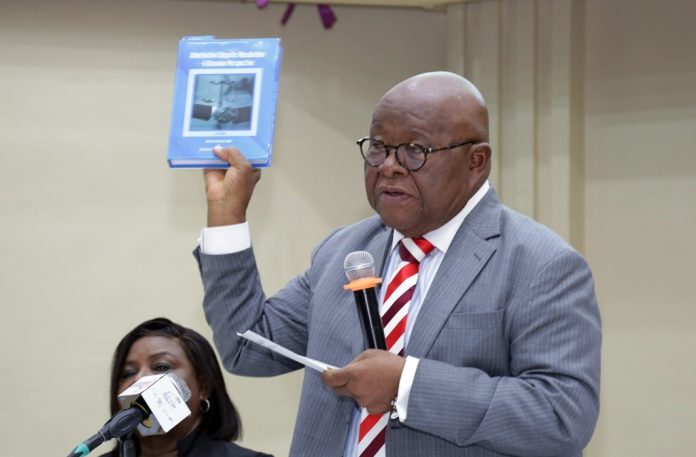A Justice of the Supreme Court of Ghana, Sir Justice Dennis Dominic Adjei, has launched a book titled “International Human and Peoples’ Rights: Law and Practice,” containing 968 pages and exploring the global framework of human rights law and its relevance to Africa’s judicial practice.
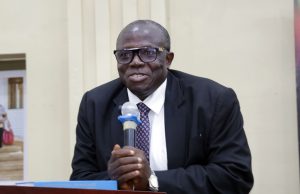
The book, which comprises 20 chapters, provides an in-depth analysis of international human rights systems, including landmark cases, commentaries from treaty bodies, and the evolution of rights from civil and political to social, economic, environmental, and collective dimensions.
The official launch took place on Friday, October 10, 2025, at the Ghana Academy of Arts and Sciences Auditorium in Accra.
Bridging theory and practice
In his remarks, Justice Adjei, who also serves as a Judge of the African Court on Human and Peoples’ Rights, said the book was inspired by his desire to bridge the gap between theory and practice in international human rights jurisprudence.
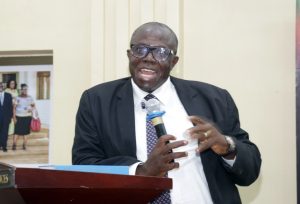
‘I wrote this book for several reasons. Wherever I travel—whether to a library or a bookshop—I find literature on the African, Inter-American, and European human rights courts, as well as on the ICC and ICJ, but never in a single volume. This book brings them all together,” he said.
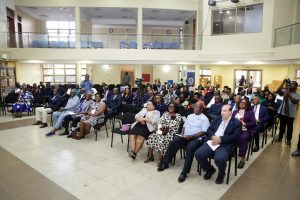
Drawing from his experience on the African Court, Justice Adjei said the work offers a comparative perspective on the world’s major human rights institutions. “Every year, the African, Inter-American, and European courts meet. I also served on the advisory committee at the ICC, and these experiences gave me a unique opportunity to study their practices,” he added.
Justice Adjei stressed the importance of understanding the legal obligations that come with international treaties, explaining that once a country ratifies a human rights convention, it must align its national laws with its provisions.
“Nobody forces a country to sign a treaty. Once you sign, you subordinate your constitution to that treaty. If there are violations, you are required to make the necessary adjustments,” he said.
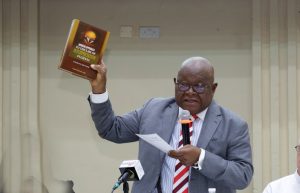
He also clarified the difference between human rights and peoples’ rights, noting that the African Charter on Human and Peoples’ Rights uniquely recognizes both. “Human rights belong to individuals—your right to life, for example. Peoples’ rights belong to communities, such as the right to development or self-determination,” he explained.
Justice Adjei said the book was deliberately written in clear and simple language to reach a wider audience beyond legal professionals.
“Everybody must get a copy. The language is simple and engaging. It will help not only lawyers but also institutional leaders and scholars to understand how international courts operate,” he said.
He added that the book covers the entire process of international adjudication—from filing applications and determining admissibility to the delivery of judgments. “From beginning to end, everything is discussed in detail. That’s why the book is quite big—968 pages,” he said with a smile.
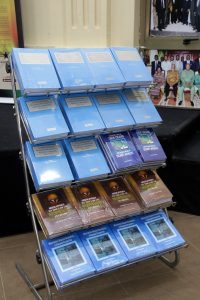
Justice Adjei also discussed the role of interpretation in judicial reasoning, emphasizing that “interpretation is not common sense; it is the effective use of appropriate legal tools.” He said the book compares interpretative techniques used by the African, European, and Inter-American courts.
“I wrote this book because I know it will serve people studying human rights and international law. It is not only a book for lawyers but for everyone interested in justice,” he said.
Praise for intellectual excellence
The event was chaired by the former Speaker of Parliament, Rt. Hon. Rev. Prof. Mike Aaron Oquaye, who described Justice Adjei as a “distinguished scholar and voluminous writer of scholastic guidance.”
Prof. Oquaye commended Justice Adjei for keeping his legal works current and relevant in a rapidly changing judicial environment. “He continues to revise his texts to maintain their accuracy and usefulness. That discipline is the hallmark of a serious scholar,” he said.
The occasion also marked the reintroduction of three revised editions of Justice Adjei’s earlier works:
“Modern Approach to the Law of Interpretation in Ghana”

“Alternative Dispute Resolution: A Ghanaian Perspective” (co-authored with Justice Barbara Ackah-Yensu)
“Essential Laws on Credit Creation and Administration of Security Interests: A Ghanaian Perspective”
Prof. Oquaye praised each as “authoritative and timely” contributions to Ghana’s legal literature, describing International Human and Peoples’ Rights: Law and Practice as an “extraordinary and comprehensive” addition to legal scholarship.
“It combines academic depth with practical insight—a one-stop resource that reflects deep research, global exposure, and unwavering dedication to advancing the law,” he said as he officially launched the book.

